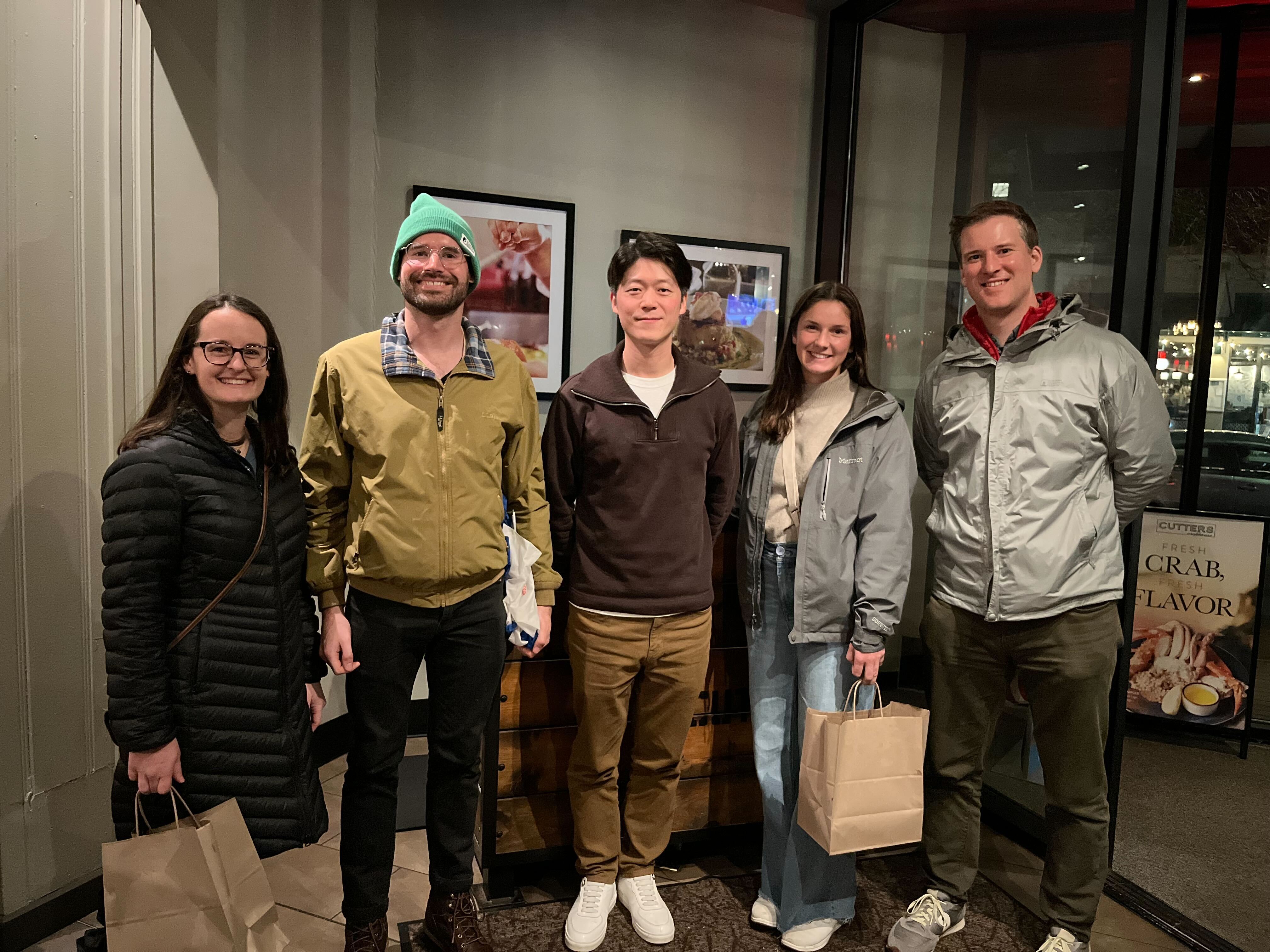AgeLab Descends Upon GSA 2024 to Present Bevy of Research
by Adam Felts
Photo: The AgeLab’s GSA presenters met with former AgeLab postdoctoral associate Chad Heesuk Son in Seattle.
A platoon of AgeLab researchers descended upon the 2024 Gerontological Society of America Conference in Seattle, Washington, exhibiting posters and presentations on caregiving, people’s attitudes toward longevity, financial risks of dementia, and climate change resilience.
Posters presented by Adam Felts and Lauren Cerino displayed findings from focus groups and a survey on the public’s attitudes toward longevity. Felts discussed people’s attitudes toward living to 100, including their beliefs in their preparedness to live to 100, their emotions related to the idea of living to 100, and what archetypes they would like to embody at age 100. Cerino covered findings on people’s predictions of how long they would live – with younger adults predicting life expectancies below the national average – paired against how long they hoped to live, as well as people’s reasons for their predicted life expectancies.
Felts and Cerino also exhibited posters on family caregiving research. Felts presented a poster developed by AgeLab researcher Lexi Balmuth on caregivers’ attitudes toward health insurers, including caregivers’ (low) levels of knowledge of whether their care recipient offered them caregiving benefits. Cerino presented research by Samantha Brady, an AgeLab researcher and current PhD student in the Brown University sociology department, on an experiment that sought to determine how caregiving status affected hiring penalties against job candidates in the hiring process.
Taylor Patskanick, who is currently a doctoral student in social work at Boston College in addition to her role as an AgeLab researcher, gave a presentation on a model developed by AgeLab Director Joe Coughlin that evaluates senior housing communities’ climate emergency preparedness and resilience. A classic matrix by William Haddon, a public health and safety researcher, on highway safety and injury prevention, was used as the basis for Coughlin’s framework. The Haddon matrix has also been used to map other issues related to older adults, such as fall prevention and mitigation and the prevention and containment of COVID-19 in institutional housing settings.
Patskanick also presented a paper on research findings from a 85+ Lifestyle Leaders panel workshop on ageism. The panelists, who are adults ages 85 and older, were asked how they define age bias, their personal experiences with age bias, and where they believed intervention might be possible to mitigate or prevent ageism. Participants expressed distinct differences between their real age, self-perceived age, and their age as perceived by others. They believed that cultural context shaped their experience of ageism, and that the United States, in particular, with its valuation of youthfulness, had its own particular “brand” of ageism. They also observed that ageism can sometimes be “benevolent,” (although still patronizing), with people iconizing their advanced age at the expense of, one participant said, “seeing my capabilities or getting to know who I am.”
Luke Yoquinto was the discussant on a panel of researchers who presented their work on examining the relationships between dementia and financial losses. Julie Miller, Director of Thought Leadership, Financial Resilience at AARP and former AgeLab researcher was the chair for the panel. Panelists were Jing Li, Associate Professor of Health Economics at the University of Washington, Tsai-Chin Cho, a PhD student at the University of Michigan, and HwaJung Choi, Research Associate Professor of Internal Medicine at the University of Michigan. Li’s presentation was on the occurrence of wealth losses prior to a dementia diagnosis, suggesting that changes in financial behavior can occur years before dementia is identified; Choi’s work, in a similar vein, looked at wealth losses that occur after a dementia diagnosis. Cho’s research touched on drivers of wealth shocks (which can cause physical and cognitive problems, including dementia) including, most notably, grey divorce. Their studies all employed data from the Health and Retirement Study, and are representative of a rising tide of significant work around personal finances and dementia derived from this important data source.
Yoquinto’s panel is part of the AgeLab’s collaboration with AARP highlighting the latest trends in research on cognitive health and financial wellbeing; in April of 2024, the AgeLab and AARP held a joint event at MIT titled Before the Diagnosis: Dementia’s Early Financial Toll.

